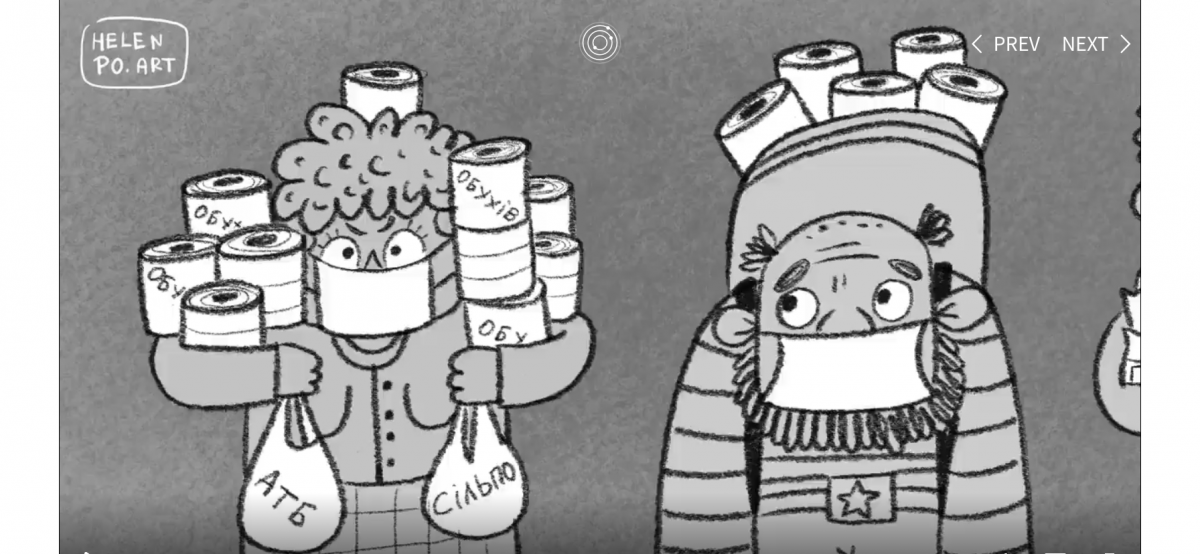Covidoscope is Online in 4 Languages
The website of the Yunus Emre Institute's Covidoscope project, which mirrors the emotional and artistic manifestations of the COVID-19 pandemic on a global scale, is now online in 4 languages. Welcoming its visitors with Turkish, English, Arabic and Spanish language options, the website puts together a collective memory of the pandemic period.
The website of the Covidoscope project, which composed a special selection of artworks reflecting the emotions and solidarity of people in the pandemic period all over the world, was launched in 4 languages. The Covidoscope website, which has started to share hints about the collection since May on its social media accounts and has been appreciated for its original design, is opening to the world in Turkish, Arabic, English and Spanish.
GLOBAL COLLECTIVE MEMORY
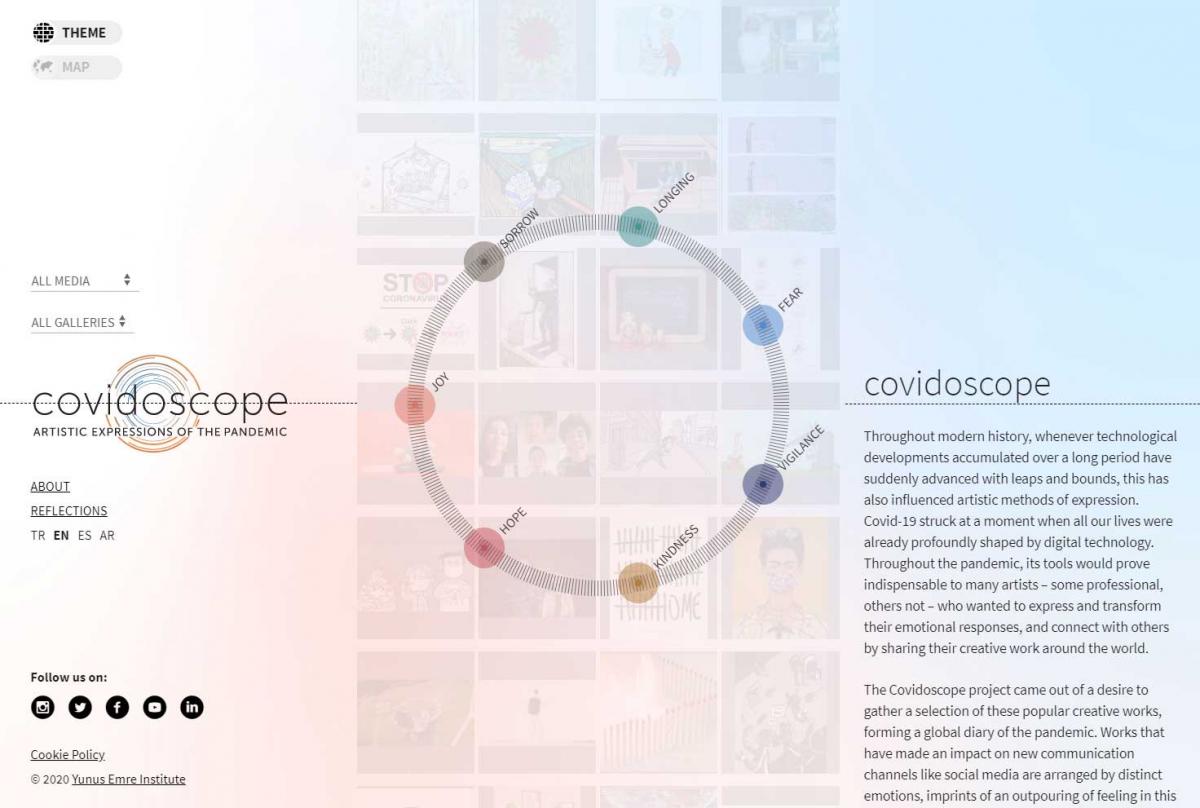
Inspired by the kaleidoscope that produces colorful patterns and beautiful images with its mirrors inside, Covidoscope compiles the best examples of artistic products in the world from the pandemic period. In the new project of Yunus Emre Institute, whose preparations have been ongoing since the start of the quarantine period, examples of production, exchange and solidarity created by the common and subjective feelings that have awakened by the COVID-19 pandemic all over the world are being mapped. The works in Covidoscope are presented with common feelings and cultural backgrounds in this new period. The project enables recording of beautiful and meaningful works that are quickly consumed every day across the world, and allows mirroring similar emotional journeys of people from different geographies through the interpretation of these works from a different perspective in this period. Covidoscope, an emotional memory project about the pandemic, has also the characteristics of a global digital archive containing partnerships and subjectivities.
Allowing the pandemic to be viewed from a different point of view, the Covidoscope project addresses this period, which has troubled the whole world, with a constructive perspective.
PROF. DR. ATEŞ: IT MIRRORS HOPE AND SOLIDARITY
Şeref Ateş, the president of Yunus Emre Institute, shared the following message after the website of the Covidoscope project was launched in 4 languages:
Prof. Dr. Şeref Ateş: Our Covidoscope project, inspired by the kaleidoscope, also known as "flower binoculars", holds a mirror to the pandemic period from an emotional and artistic perspective. In Kaleidoscope, a colorful and harmonious image emerges with the reflection of mirrors on one another, but this time such a colorful and harmonious appearance is formed thanks to the artists who hold mirrors to their souls and atmospheres to overcome this difficult period. So, we wanted to reflect this view with the Covidoscope, share the kindness and beauty and increase the hope and solidarity. |
"Our covidoscope project, inspired by the kaleidoscope, which we also call "flower binoculars", holds a mirror to the pandemic period within the sight of emotion and art. In Kaleidoscope, a colorful and harmonious image emerges with the reflection of mirrors on one another, but this time such a colorful and harmonious appearance is formed thanks to the artists who hold mirrors to their souls and atmospheres to overcome this difficult period. So, we wanted to reflect this view with the covidoscope, share the kindness and beauty and increase the hope and solidarity. The Covidoscope selection includes examples from a wide variety of art branches, different initiatives showing the unity and solidarity of people, new approaches produced to sustain art under limited conditions, and very distinct perspectives."
Şeref Ateş, the president of Yunus Emre Institute, shared the following message after the launching of Covidoscope website in 4 languages:
“Covidoscope project of Yunus Emre Institute, which compiles artistic expressions of the pandemic, mirrors the unity of feelings as well as hope and solidarity, is now online in 4 languages at https://covidoscope.org! With gratitude to those who made efforts to get through this difficult period ... "
SOLIDARITY AND KINDNESS MOVEMENTS AT COVIDOSCOPE
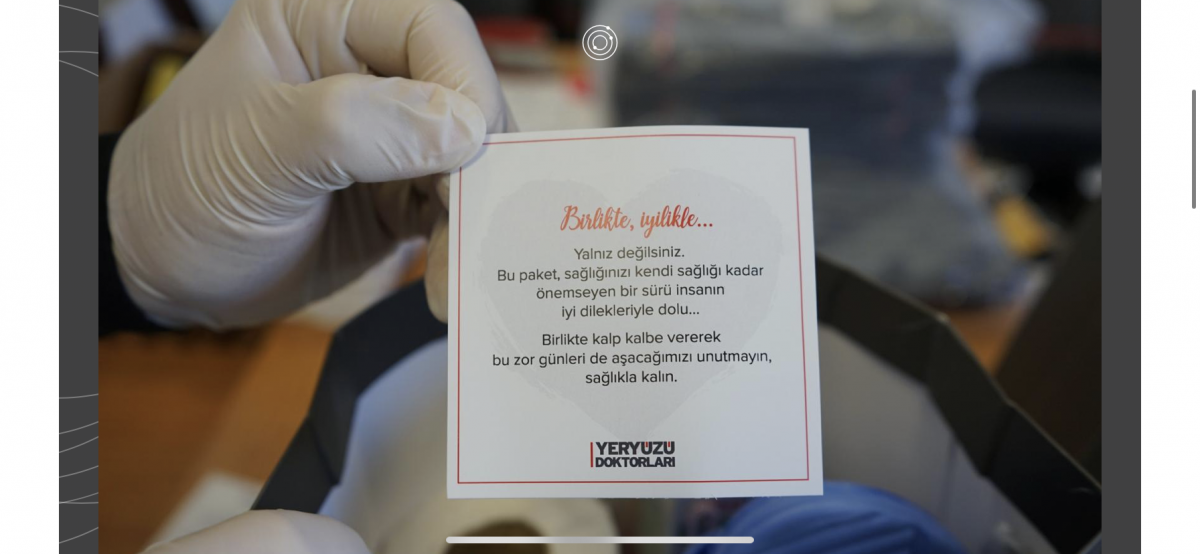
Covidoscope also gives a special place to the cooperation, solidarity and kindness movements, whose examples have been seen often during the pandemic period. Initiatives and activities in this direction are considered as aesthetic expressions and included in the collection too. In this context, the special support kit campaign of the Turkey-based Yeryüzü Doktorları Association during the pandemic period is among the works featured in the "Kindness" gallery.
The works on the website of the Covidoscope project are presented in 7 categories under the themes of kindness, prudence, fear, hope, longing, sorrow and joy. There is also a map option to see the works on the website, which has a very colorful design, on the basis of the country where they were produced. To visit the Covidoscope collection, a route can be determined on the world map at www.covidoscope.org, or the galleries organized according to emotional themes and containing data on cultural background can be visited.
KINDNESS
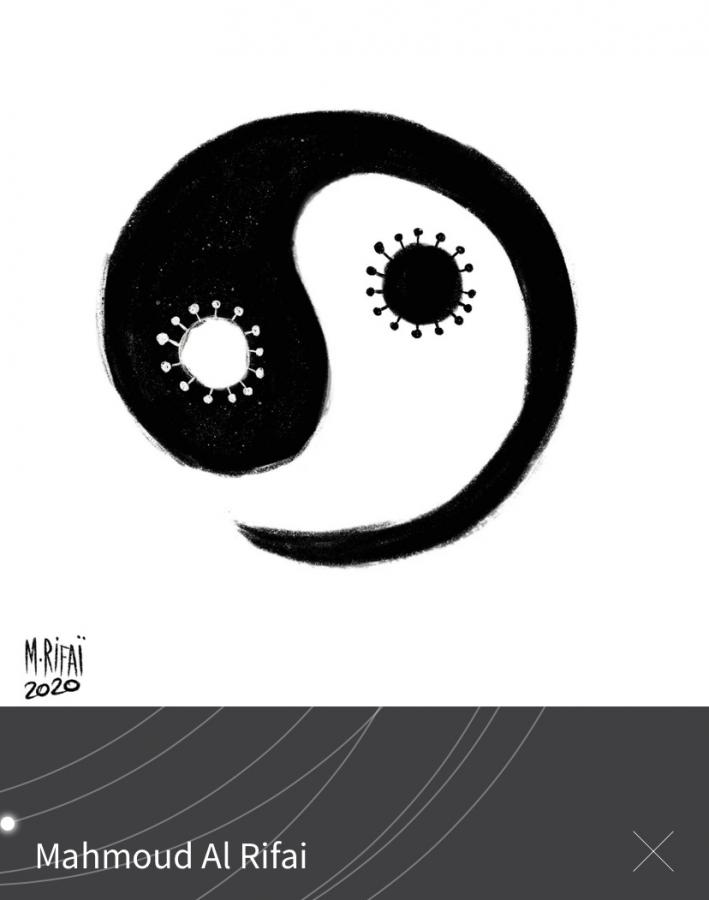 Covidoscope addresses the concepts such as charity, friendship, generosity, gratitude and solidarity in its works under the title of "kindness". Works on solidarity and kindness exhibited during the pandemic period are considered under this title.
Covidoscope addresses the concepts such as charity, friendship, generosity, gratitude and solidarity in its works under the title of "kindness". Works on solidarity and kindness exhibited during the pandemic period are considered under this title.
PRUDENCE
The adaptation of people to the rules that must be strictly adhered to such as acting with caution, wearing masks, isolation, distance, and cleaning in order to survive and protect the health of their loved ones in this new period are addressed through the works in the "prudence" category. The difficulties of working from home, which are more prevalent in our lives than in the previous period, are also addressed.
FEAR
The category of “fear” covers the subject of how the pandemic makes this emotion, which is already familiar, constantly apparent in daily life. Difficulty in accessing food, shelter and education are among the issues addressed in this category. The works in this section especially remind us that this state of fear is not absolute and unchangeable.
LONGING
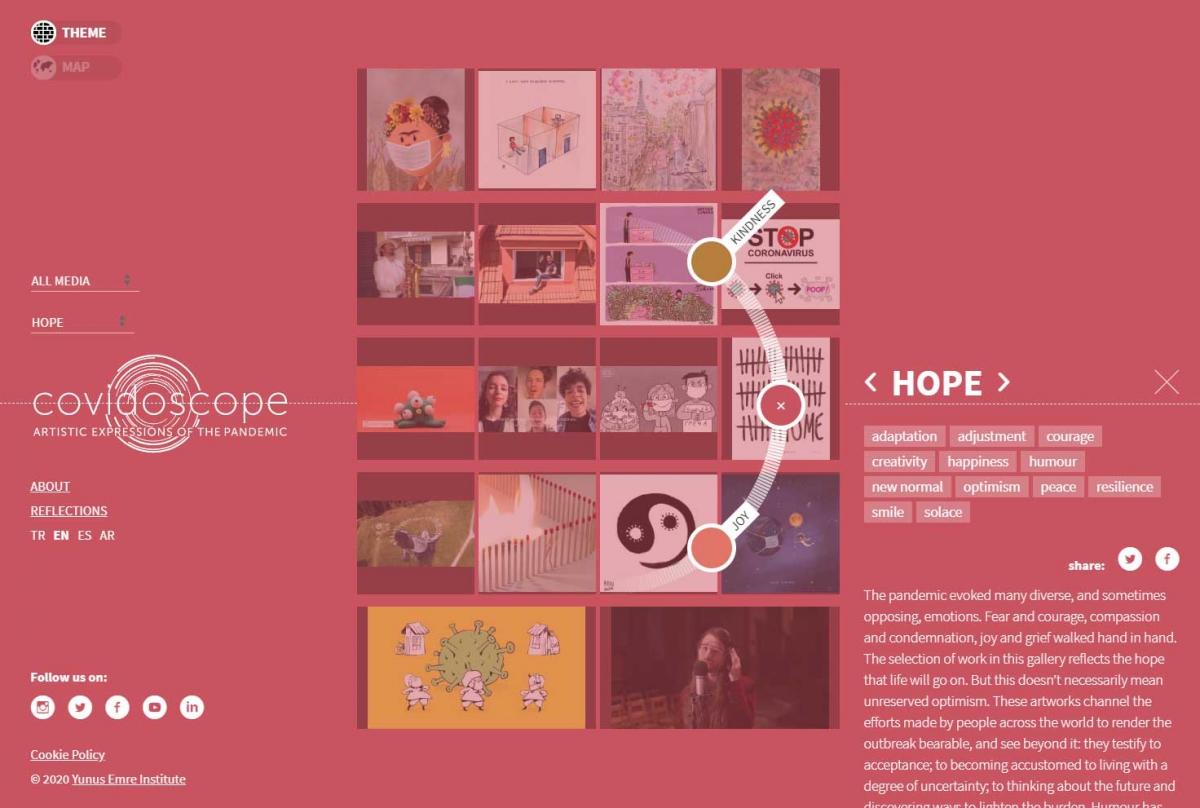
People had to change their normal lives with the pandemic and also stayed away from their old habits and loved ones. Many people have lost the people they love the most. The works in this section reflect the feelings of people who experience loss, pain, anxiety and longing.
SORROW
The loss of life, economic difficulties and anxiety caused by the pandemic triggered many negative emotions. Hundreds of thousands of people lost their relatives due to this unknown disease, whose name they heard out of nowhere. Hundreds of thousands were seperated from their loved ones. The works in this section reflect the expression of feelings such as sadness, hopelessness, loneliness and disappointment through words, sounds and images, and remind us that none of us are actually alone.
JOY
In the air of uncertainty specific to the pandemic, sudden moments of joy were experienced from time to time. People have realized that they have neglected many things that connect them to life so far, due to the momentum of modern life. Spending more time with the family, hearing bird sounds more, and seeing wild animals have become a source of joy. The collective applause of healthcare professionals as an expression of appreciation and admiration has increased the enjoyment of solidarity. Although it has not always been easy to stay optimistic in the face of the pandemic, it has also been experienced during the pandemic that joy has not been far away despite all. The selection in this gallery reminds people that even in fear and mourning, people have a great talent for joy and pleasure.
HOPE
|
Alyona Potyomkina / Ukrayna |
The works in this section of the Covidoscope site emphasize that hope will never run out in life, amid conflicting emotions such as grief-joy, fear-courage during the pandemic period. The main axis of the works in this section is the effort to empower each other through humor, to make the pandemic bearable, to learn living with uncertainty and to see beyond.
GÜLSE BİRSEL, RESUL ERTAŞ and FIRAT ÇELİK ARE ON COVIDOSCOPE!
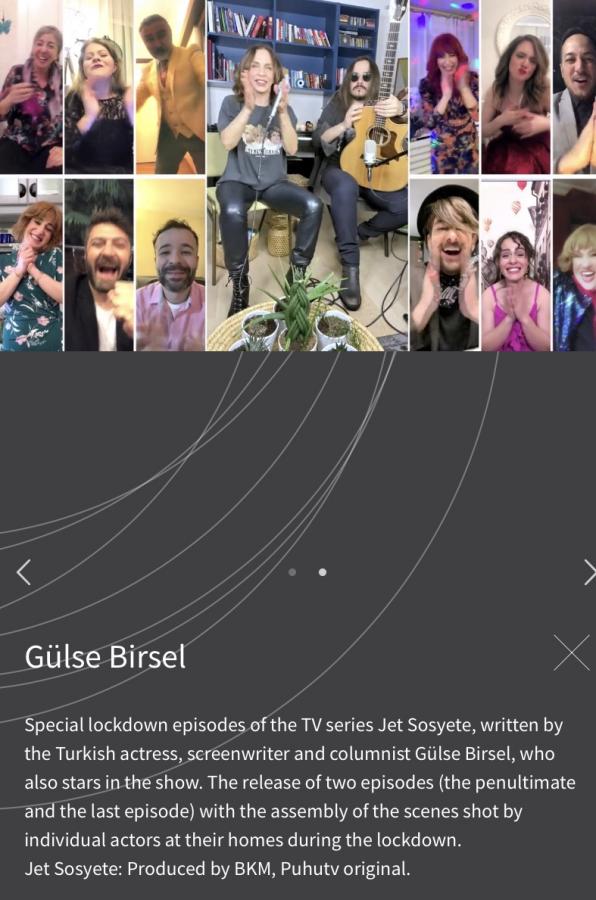
The collection with works from nearly 40 countries, also includes some works from Turkey: The story of how the "home-made" episodes of Jet Sosyete series which has Gülse Birsel as its screenwriter and lead actor, shot in the conditions of quarantine during the pandemic are addressed in the "Hope" and "Kindness" galleries of the collection from a perspective of solidarity through humor. In addition, the collection also includes the remarkable masked works of Resul Ertaş, Ertan Akay and Gülnihal Küpeli. The dance performances that Turkish actor Fırat Çelik, who lives in France, took with his nephew Ozan during the quarantine in their garden and received a great deal of attention on social media, can be seen in the "Joy" gallery of the collection.
THE AUTHOR OF "THE BOOK OF HUMAN EMOTIONS" IS ALSO ON THE PROJECT
Among the consultants of the project, which emphasizes the solidarity between people going through the same unexpected and difficult process and the unification of emotional experiences, are Dr. Tiffany Watt Smith, author of “The Book of Human Emotions”; historian, translator and writer Saadet Özen and psychiatrist Prof. Dr. Kemal Sayar.
DR. SMITH: IT WILL CAST LIGHT UPON EMOTIONAL JOURNEYS
Dr, Tiffany Watt Smith: Covidoscope will be a very important resource in the future to help understand this interesting period and how people around the world were feeling during this period. |
Dr. Tiffany Watt Smith made the following comment on the Covidoscope project: "Covidoscope is a very important and impressive project. Amid pandemic, health fears, rapidly changing news, and alterations in working and living conditions made it difficult for most of us to react, let alone doing or producing anything. In this respect, this work is an indication that the Covidoscope work team has generously set forth a forward-looking vision, bringing together artistic works produced in the process of COVID-19, which are at risk of disappearing at the speed of the digital world, and realizing the need for an accessible archive that will cast light upon emotional journeys in this period. As a historian whose work is on emotions, I can say that for those who work in these fields like me, Covidoscope will be a very important resource in the future to help understand this interesting period and also how people around the world felt during it."
"IT WHISPERS THAT WE HAVE REASONS TO BELIEVE IN HUMAN KINDNESS"
Prof. Dr. Kemal Sayar: We humans may not be able to choose the events that happen to us, but we can choose how to react to them. Covidoscope refreshes our memory in an age of forgetfulness. And it whispers that, in an age of despair, we still have reason to believe in human kindness. |
Prof. Dr. Kemal Sayar, one of the consultants of the Covidoscope project, stated that the project revealed the human imagination and the ability to hope during the quarantine days, when humanity was united around a common destiny and said, "We humans may not be able to choose the events that happen to us, but we can choose how to react to them. Covidoscope refreshes our memory in an age of forgetfulness. And it whispers that, in an age of despair, we still have reason to believe in human kindness.
“In the corridors of Covidsocope, we realize that there are much more emotions that unite people than those that divide them. Stating that a significant portion of the works here are those that are presented to have a healing effect on human beings, Sayar also added that we can build a better future by remembering what happened and taking lessons from it.
COVIDOSCOPE REFLECTS THE DIVERSITY IN SEARCH FOR A CURE
Author Saadet Özen, on the other hand, stated that the periods when technological developments transform the quality of human life also affect art and emphasized that the Covidoscope project coincides with a historic moment. Referring to the function of the project in reflecting the feelings and problems of humanity during the pandemic period, Özen made the following assessment: “The common feature of the works is that they are produced concurrently. The first thing this makes you think of is common feelings… When we go one step further, we see that what needs to be addressed is individual reactions and problems that are right next to common feelings. Although the feelings were the same, nobody gave the same reaction. Locality and living conditions diversified the reactions. The worry was the same, but the search for remedies was not the same for anyone. We wanted this diversity to show itself in this museum. It is necessary to try to reflect that diversity as much as possible. Yunus Emre Institute is already making great efforts for this to happen."
GREAT INTEREST FROM ARTISTS ALL OVER THE WORLD
 The project established a private communication with artists from different parts of the world from India to Turkey and from Mexico to Iran since its first works. Artists who are in contact, interpret this digital memory project as a contribution to world solidarity through art.
The project established a private communication with artists from different parts of the world from India to Turkey and from Mexico to Iran since its first works. Artists who are in contact, interpret this digital memory project as a contribution to world solidarity through art.
HOW IS THE COLLECTION CREATED?
All over the world, interesting artistic initiatives and aesthetic narratives in different fields that have already been produced during the pandemic are selected by a large research team. A special collection of the most qualified and original works is created to be posted in Covidoscope digital galleries.
The selected works are not limited to modern art works. All aesthetic works reflecting the period such as cartoons, illustrations, photographs, solidarity concerts given by artists on online platforms, special compositions and interpretations about the pandemic, examples of wall and land art, animation films can have their places in the Covidoscope collection.
The Covidoscope digital collection brings together globally recognized, prominent examples of these aesthetic works produced in different parts of the world, with the voluntary approval of the authors, and presents a picture of these rapid and varying emotional responses to the pandemic.
The collection is created by a special team of research and consultants from different disciplines, and the liaison network of Yunus Emre Institute, which has nearly 60 centers worldwide, is actively used in these studies.
Although it started with the pandemic, artistic expressions of the period will continue after the pandemic has ended. The Covidoscope project will carry on to keep track of this production and update the collection.


